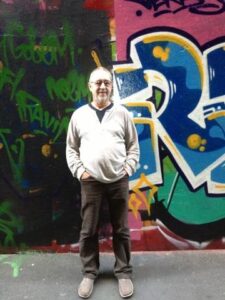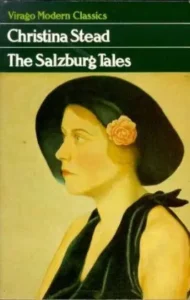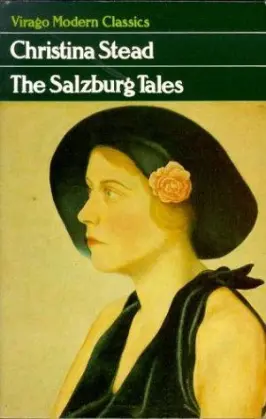by Bill Holloway
 Continuing our occasional series of posts on Ocean of Story: The Collected Works of Christina Stead.
Continuing our occasional series of posts on Ocean of Story: The Collected Works of Christina Stead.
There are a couple of excellent biographies of Christina Stead. I have Chris Williams’, Christina Stead: A Life of Letters (my review), and there is also Hazel Rowley’s (Lisa Hill’s review), but it is still a pleasure to run into the author talking about her own life and work, which we do in the final section of Ocean of Story.
The stories in this, seventh, section are:
A Waker and Dreamer (about Stead’s father – reviewed here)
A Writer’s Friends
Les Amoureux
Another View of the Homestead
Did it Sell?
The Magic Woman and Other Stories
followed by an Afterword by RG Geering
A Writer’s Friends
Stead, it seems, remembers all her writings:
I first made my mark with a poem written suddenly in arithmetic class, at the age of eight…
My next achievement, my first novel, was an essay at the age of ten, on the life-cycle of the frog. I was content with it, it could not have been better; the style was good, I defended some irregularities and the teacher stood by me. I remember the feeling of certainty accompanying both these productions. You are lucky to feel it: it is rare.
She writes so easily, and makes you feel so close. Later, of her high school years she says, “It was accepted by this time at school that I was a writer; and I accepted it simply, too, without thinking about it.”
 Her last couple of years of High School were at Sydney Girls High and from there she went on to teachers college. She got her Dip.Ed. but only briefly worked as a teacher. At SGH she began to collect material for an encyclopedia of ‘obscure men’, without any idea of being a writer, she says, though this did eventually lead to her first novel, Seven Poor Men of Sydney. And at teachers college a young art teacher – who encouraged her pupils to loose their hair and dance barefoot on the grass in the moonlight – “said that if I did a book of short stories, she would do the illustrations.” They did, and a “well-known publishing house” said they might do something “if a British firm did it first.”
Her last couple of years of High School were at Sydney Girls High and from there she went on to teachers college. She got her Dip.Ed. but only briefly worked as a teacher. At SGH she began to collect material for an encyclopedia of ‘obscure men’, without any idea of being a writer, she says, though this did eventually lead to her first novel, Seven Poor Men of Sydney. And at teachers college a young art teacher – who encouraged her pupils to loose their hair and dance barefoot on the grass in the moonlight – “said that if I did a book of short stories, she would do the illustrations.” They did, and a “well-known publishing house” said they might do something “if a British firm did it first.”
She tells how much later the stories were lost when a Paris hotel held on to her suitcases, but when Peter Davies asked her to write something else before he would publish Seven Poor Men, she revived a few of them for the linked collection that became The Salzburg Tales (my review).
Les Amoureux
Stead and her husband William (Bill) Blake, lived a year here, a year there, through England, France, Belgium and Switzerland, both before and after WWII (which they spent in America), living in cheap hotels and rooming houses. Working in Brussels after the War, they came across a nice looking little hotel, with a cafe downstairs and a big room to rent up above. Bill warned her, “There is one thing you may not like. The street door into the hotel, at the side, has Pallas Athene in leaded lights.” But the hotel is very clean and the sheets are changed every day. I think Stead is implying that the hotel was a bit racey. Friends well connected in society tell her that Princess N and Monsieur A have been having an affair – “All Brussels knows” – and meet at the hotel once a week. The landlady speaks of them as Les Amoureux. For whatever reason, they move on to Holland, to The Hague, where Stead has a room less comfortable, but more conducive to writing. “I wrote in three months a novella called Uncle Syme which later became Cotters’ England” (my review).
This is an interesting example of the way she worked, always having a number of ms on the go, and incorporating old stories into new. In fact, after Holland they moved on to England where she did the research for Cotters’ England and still it wasn’t published for another decade.
Another View of the Homestead
Stead doesn’t say so her but after 40 years out of Australia she wasn’t much respected at home, except by other writers, she was not published here, and she lost a major literary prize for being insufficiently Australian. She initially returned home in 1968, after William Blake’s death from cancer and her being awarded a fellowship for a year at ANU. After which she went back to England for another couple of years, before finally returning for good.
This story is some of her impressions of flying home, comparing them with her impressions four decades earlier of leaving Sydney by sea. “For years, I thought hazily about returning ..” thinking of her old homes, Lydham Hill, now long gone, and Watson’s Bay: “By a magic that I came by by accident, I was able to transport Watson’s noiselessly and as if it were an emulsion or a streak of mist to the Chesapeake” [as the setting for The Man Who Loved Children]. I love her writing. Coming home ..
I came by air, the sailor dropped by a roc, Ulysses home without all that reconnoitering of coasts, a temporary citizen of a flying village with fiery windows, creaking and crashing across the star-splattered dark …
Unlike the ship, though close-packed as a crate of eggs, we travel with people we may hear but never see. There is only one street in the flying village and in it you mainly see children conducted up and down.
Soon she is back again in shadowy England, and what she remembers is “the wonderful light”.
Did it Sell?
Did it Sell? (or was it Hell) is a short play, an entertainment for friends apparently, not meant to be performed, in which the Minstrel (the author) is constantly asked, by ‘fiends’ not friends, Did it sell? Was there more than one edition? Was it a best seller?
The Magic Woman and Other Stories
Geering in his Afterword says this is the title Stead gave to her contribution to a Symposium on Women’s Intuition in Vogue (US) in 1971, published as ‘About Women’s Insight, There is a Sort of Folklore We Inherit’.
Stead seems to be saying that there are all sorts of situations in which we ascribe ‘intuition’ not just to women, but to anyone who must make a decision on the run. She writes, “About women’s insight, there is a sort of folklore we inherit. Many women and more men believe in women’s peculiar gifts of divination.” I’m not sure Stead believes. I’m not sure I believe, except that throughout my life women have understood and explained my behaviour much more clearly than I could myself.
Afterword
Geering’s Afterword is a brief biography; an explanation as to why some stories which might have been included were not; and a background to each story, their relationships to each other and to Stead’s novels; what aspects of Stead’s life contributed to them, and so on. Definitely worth reading, as of course is the whole collection.
.
Christina Stead
Ocean of story: The uncollected stories of Christina Stead
Ringwood: Penguin Books, 1986
552pp.
ISBN: 9780140100211
Bill Holloway, the author of this review, blogs at The Australian Legend. He is an old white guy the subject of whose (very) mature age M.Litt thesis was ‘The Independent Woman in Australian Literature’.






This whole question of whether a book or an author is Australian “enough”, it’s such an enduring point of contention. In general, too, this matter of “enough”-ness. If one looks too much outward, that’s problematic (over-ambitious, irrelevant, arbitrary); if one looks too much inward, that’s problematic (narrow-minded, inexperienced, repetitive). She must have found that very disheartening.
I haven’t read all of Stead, but I don’t think she regarded herself as an ‘Australian’ writer. She had some Australian and autobiographical stuff to get out of the way when she began writing, but after that her subjects were where she was, in the US, Europe and England.
Australian writers followed her work, but publishers wouldn’t touch her and poverty kept her from coming home. The big problem was her commitment to Communism in such conservative times – though it was a commitment shared by quite a number of her contemporaries who stayed home.
She had one, large, prize withdrawn because she was insufficiently Australian, came home on a one year fellowship to ANU, and then Patrick White used the money from his Nobel to begin a prize, and made her the first recipient.
May I just mention that Stead’s childhood home in Bexley is now reopen for visitors. For some reason curator considers Christina on a less importance then her father, naturalist. If anyone decides to change curator’s view please visit the house. Bookings via St George Historical Society website.
I also recently published on stead’s years in Lydham Hall. Some previously unreported biographical information was brought to the light: https://nla.gov.au/nla.obj-3227786284/view